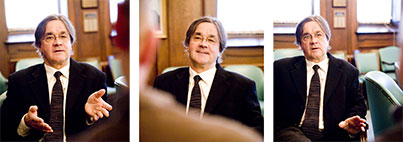Entre Nous with James Lund, Dean of the Faculty of Dentistry
Entre Nous with James Lund, Dean of the Faculty of Dentistry McGill University
User Tools (skip):
Entre Nous with James Lund, Dean of the Faculty of Dentistry
A program with teeth

When asked why he chose dentistry as a career, James Lund laughs, "Because the program was one year shorter than medicine."
Claudio Calligaris
When he was appointed as the Dean of Dentistry in 1995, James Lund took charge of a program that was struggling and helped transform it into one of the nation's most vibrant schools. A former Aussie Rules footballer ("It's not a good game for dentists to play," he says wiggling digits that jut at unnatural angles), Lund isn't shy about expressing his opinions on everything from the current state of the Faculty to the Medicare system.
Is it safe to say that, upon your appointment as Dean in 1995, the Faculty was going through a rough period?
When I arrived, McGill had just decided not to close the faculty — which Senate had voted to do in the early 1990s. At the time, the faculty was considered to be non-academic because faculty members did little research and we had almost no graduate students. Luckily, there had been a sufficient outcry both from within McGill and from the outside that the decision was made to keep the faculty open.
As well, six professors, a third of our faculty, were retiring but, due to budget constraints, the university decided not to replace them immediately. So, yes, let's just say it was a little tough early on.
How has the Faculty changed since then?
On top of developing both Masters and PhD programs, we also entirely revamped our undergraduate program so that our students study side-by-side with medical students for the first 18 months before finishing with two-and-a-half years of dentistry courses.
We've gone from having almost no research to being one of the most research-intensive dentistry faculties in the world per head. We're still very small, but the productivity of our people is probably the best in the world in terms of research dollars brought into the university. We've developed four areas of research: pain; biomaterials; bone and periodontal research; and things that broadly fit into health and society, such as clinical trials, health-care delivery and the barriers to health care.
And then there's your Dental Outreach Program, correct?
Although we were doing some outreach work before, we really started developing it in the late-1990s. Now outreach is a major part of our program and we work with numerous community organizations including Sun Youth, Dans La Rue, Familjeunes, Action Centre, the Old Brewery Mission and the Maimonides Geriatric Centre. We pack up our stuff and treat patients in bingo halls, gymnasiums, cafeterias - wherever we can. Every student is required to participate and, while they do the treatment, volunteer dentists supervise.
For procedures that require more time or resources, like X-rays, we refer patients to the clinic we run at the Montreal General Hospital three or four Saturdays a year.
Why the emphasis on outreach?
First and foremost, because dentistry isn't covered by Medicare, there is a huge need among the population. It is an absolute aberration that teeth are not covered by Medicare while every other part of your body is. What are young families who are struggling just to make ends meet to do?
Second, young dental students need to meet these people. This is invaluable experience for them.
Finally, we see this as a demonstration project. Forty percent of Canadians never see a dentist except for an emergency — in poor areas, that number can be closer to 90 percent. We hope that we can prove to the government that one viable option to deliver dental care to the population at a relatively low cost is to create community clinics and staff them with graduating dentists.
Speaking of Medicare, why don't our politicians take their cue from certain enlightened Scandinavian countries and foot the bill for such procedures as dental implants?
Probably because edentulism, having no teeth, is not something that not many of our Parliamentarians suffer from. But more than half of Quebecers over the age of 60 have no teeth. There is a stigma attached to it, like having hemorrhoids. No one talks about it and there are no lobby groups. But, according to the World Health Organization definition, having no teeth is a disability.
You're into the home stretch of your mandate as Dean. What will you be tackling over the next 18 months?
Funding is always an issue. It is essential to keep students abreast of the latest technologies - a difficult task because our budget is probably the smallest of any dental school in Canada, if not North America.
In our clinic, we're moving away from paper patient records and film images to electronic records and digitized images - the two go hand-in-hand.
As well, we want to update our pre-clinical simulation unit so that they more closely resemble an actual clinical setting. Of course, all these things require fund-raising. Luckily, over the past few years we've had the highest rate of giving of any alumni group and are very close to the highest average gift. Their support has been incredible.
Search
Search (skip):
Dean Lund's first job
My first paying job was working at a food counter in the Parklands of Adelaide in Australia, serving meals and cleaning up. I was 17. However, I had many unpaid jobs before that. My father had several businesses, including a service station. As a high school student and later when I was in university, I spent most weekends pumping gas and doing minor repairs. I haven't touched a car since — except to drop mine off at the garage when something goes wrong.

